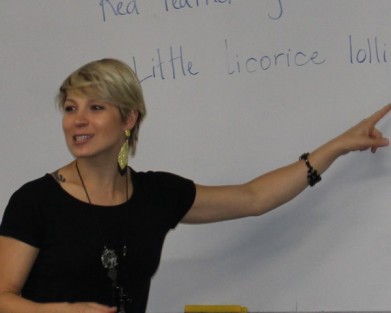 People often ask me ‘why’ I do not have a Brazilian accent or how I got rid of it. Some students look at me in disbelief when I tell them where I am from and they say ‘so you’ve lived here for many years’ or ‘so you’re married to an Aussie.’ No!
People often ask me ‘why’ I do not have a Brazilian accent or how I got rid of it. Some students look at me in disbelief when I tell them where I am from and they say ‘so you’ve lived here for many years’ or ‘so you’re married to an Aussie.’ No!
Truth is I have always dreamt of speaking English fluently and naturally because when I was a kid I wanted to live in an English-speaking country and talk to native speakers as if I was one of them. Along with that, also in my dreams I wanted to be an English teacher and I thought: ‘a good English teacher should be the role model for their students!’. Thus, I have always strived to master pronunciation. How did I do that? Studying!
I remember I used to borrow listening and pronunciation books from the school library and I would listen and repeat sentences until I had memorized them and was able to say them as naturally as possible without pausing. Besides, I loved learning song lyrics and singing along. I believe it helped me take notice of some important features of pronunciation, such as connected speech and differences between British and American accents. Simple exercises like reading aloud and talking to myself (by the way, I still do that all the time!) also helped me a great deal.
I am telling you this to prove to you that mastering pronunciation is an achievable goal. It might take some time but you can surely do it with some hard work and determination!
Why is pronunciation so important?
The way you shake hands, the way you smile and look people in the eyes when you meet them can say a lot about you. So does your pronunciation!
If an employer interviews two people that have the same level of English, which one do you think he’ll choose? Obviously the one with the best pronunciation!
You may think that having good grammar and vast vocabulary is enough to be a good English speaker but it is a huge mistake. Do not take pronunciation for granted! I’ve seen and heard of people who have been through embarrassing situations or even students who got a low score at speaking tests due to poor pronunciation.
What I mean is, you can say a perfect sentence but will still not be able to convey your message because you mispronounce words or use the wrong intonation. At the same time, you can easily make yourself understood by saying something in a simpler way. In a nutshell, correct pronunciation leads to more efficient communication and consequently better outcomes.
Mind you: you don’t necessarily need to sound like a native speaker but you should try as much as you can to reduce your accent, use proper intonation in sentences, pronounce words clearly and correctly in order to have more fluid conversations. After all, it is not pleasant to struggle to understand what people are saying.
It is also important to highlight that pronunciation issues can possibly interfere with listening, since our brain tends to recognise familiar sounds. Therefore, if you have the pronunciation of the word different like this /dɪˈfrənt/ (wrong stress) ‘in your records’, you may not distinguish it when you hear /ˈdɪfrənt/ (correct stress).
First steps to better pronunciation:
Understanding why you need to improve your pronunciation is the very first step. Next, you need to believe you can do it and pursue it.
- Become an attentive listener. Improving pronunciation takes time, so turn on y
 our ‘listening ears’ and observe how people articulate their mouth and try repeat words out loud to memorise them.
our ‘listening ears’ and observe how people articulate their mouth and try repeat words out loud to memorise them.
- Copy your teachers’ pronunciation or native speakers around you.
- Be aware of your mistakes and correct them.
- Recite tongue twisters. This is an excellent exercise to strenghten lips, tongue and cheek muscles and as well as to practice articulation and the correct placement of your tongue lips and teeth. Check this out: http://www.schooljokes.com/tongue_twisters/index.shtml
- Read aloud
- Do not be afraid of making mistakes! Just throw yourself into speaking as much as you can and don’t worry about the mistakes, this is part of the learning process.
- Don’t be shy! Every language has its particular sounds and they can be very different from the sounds you have your in your language, which can make it hard for you to pronounce them correctly, and can possibly make you feel uncomfortable (not to say ridiculous) pronouncing them. Bear in mind that this is how English sounds and you won’t feel awkward making funny sounds such as the ‘th’.
- Watch TV programs, listen to podcasts, radio stations and take notice of the pronunciation of words, and intonation of sentences and repeat, repeat, repeat!
- Use a dictionary! When you come across a new word the first thing to do is to check its pronunciation before guessing how to pronounce it and take notes of the phonetic transcription. If you mispronounce it once it will be very likely that this pronunciation will be fossilized in your brain and it will be really hard to change it later. Some dictionaries bring two phonetic transcriptions of a word (British x American or noun x verb) but only one recording. For this reason it is very useful to study the phonetic symbols, so that you can get more information out of your dictionary.
Speaking of phonetic symbols here is a tip: Download the extremely simple and user-friendly app Macmillan Sounds for free to get acquainted with the phonetic chart and practice the sounds of English through games. (I love it! I do it on the bus! Using earphones, of course!)



Also, jump online and have a go at these websites:
- lyricstraining.com on this website you can practice listening and pronunciation as well as having fun doing it!
- photransedit.com this one can help you with pronunciation of verbs in the past, adverbs derived from adjectives, stress changes due to the addition of prefixes or suffixes to words, which most dictionaries do not show, and even sentence stress patterns. The only drawback is that it does not have audio.
I hope I have helped you by sharing my experience as a student and have encouraged you to work on your pronunciation to become a better speaker!
Good luck with your studies!
Milene, UFO Teacher, Langports Sydney